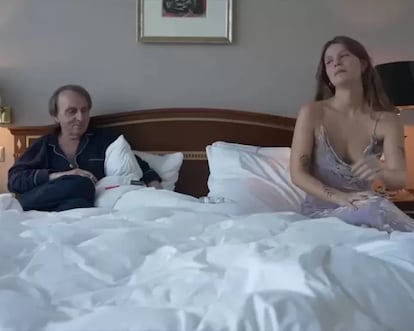Michel Houellebecq loses lawsuit to block release of sex film
A Dutch court authorizes the KIRAC art collective to release the experimental movie, while the French novelist vows to appeal

The story seems straight out of a Michel Houellebecq novel. It’s all there: abundant depravity, existential angst, pornography and contemporary art. But perhaps it’s a bit more prosaic: the story of an aging man going through a rough patch who gets tangled up in a bad situation.
The experimental film in which Houellebecq has sex with several women cleared a decisive legal hurdle, despite the French writer’s attempts to block the film’s release. Shortly after Dutch art collective KIRAC (keeping.it.real.art.critics) won the lawsuit brought by Houellebecq, his lawyer said they would appeal the decision, reported Le Figaro.
The author of acclaimed novels like Platform (2001) and Anéantir (2022) asked an Amsterdam court to prohibit the film’s distribution claiming it violated his privacy rights. This is the second time Houellebecq has lost a lawsuit against KIRAC. In early March, a French court ruled that the film’s trailer did not violate his privacy. Initially scheduled for March 11, the two lawsuits postponed the premiere.

What began as an artistic fling between a well-known rabble-rouser and a filmmaker with a similar penchant for provocation ended in a vitriolic falling out replete with accusations of deceit and disloyalty. It’s a dramatic comedy – a dramedy – in three acts.
Act I
Paris, early November 2022. Houellebecq’s wife, Qianyum Lysis Li, has dinner with visual artist and KIRAC principal Stefan Ruitenbeek and his friend, Jini van Rooijen, also known as Jini Jane. In an article for the French weekly Le Point, Houellebecq wrote that he stayed home that evening because he was depressed. At dinner, someone came up with the idea to shoot a threesome sex scene with Houellebecq, Lysis Li and Jini Jane. The video would be posted to Jini Jane’s OnlyFans (adult content) channel. “My wife agreed, thinking that it would improve my mood,” writes Houellebecq, who said he would do it under the condition of anonymity. The couple put on masks, and Ruitenbeek shot the scene.
Act II
Amsterdam, late December 2022. After doing the sex video in Paris, the writer and his wife stayed in contact with Ruitenbeek and agreed to shoot an entire film. But Houellebecq still demanded anonymity “for personal tranquility.” In the Le Point article, Houellebecq writes that he and his wife traveled to Amsterdam to cast several women for the film, and things started going sideways right away. Houellebecq didn’t like that Ruitenbeek immediately started filming the couple without permission. Later that evening, he showed up with the cameraman in Houellebecq’s hotel room with a contract that the writer signed. The next day, the filmmaker returned with a woman identified as Isa, with whom Houellebecq exchanged a few kisses. This scene was included in the film’s trailer, which was taken offline a few weeks ago due to the lawsuit. This was the first disagreement between the writer and the filmmaker; the big fight came two days later.
Act III
Paris and Amsterdam, March 2023. When Ruitenbeek posted the trailer on the Internet, Houellebecq was surprised to see himself in a film he says he didn’t agree to release. He took the case to the French and Dutch courts to block the film. On March 3, a Paris court rejected his claim, and an Amsterdam court did the same on March 28. Both judges recognized a legal contract existed and concluded that Houellebecq had enough time “to review the contract content and refuse to collaborate.” They also found it “incomprehensible” that Houellebecq would allow himself to be filmed “if he found the agreement problematic.” Ruitenbeek’s film now had the green light.
One controversy after another
In an open letter to Ruitenbeek, Houellebecq writes, “Today I am paying for the violence caused by your trailer, which is an irreparable attack on my private life… I formally object to the scenes of me you duplicitously filmed (I repeat, they were obtained before the signing of the contract and because, at that point, it was only for posting to an OnlyFans account) and used in your films – this one and others.” However, in the same issue of Le Point, Houellebecq claims that the trailer was shot in Amsterdam after the contract was signed, unlike the OnlyFans scene shot in Paris.
Houellebecq’s defense in the Netherlands case claimed he “was depressed and drunk” when he signed the contract and “didn’t know what he was agreeing to.” On the other hand, Ruitenbeek claimed that the writer permitted him to film “in full knowledge of the facts.” When we contacted Ruitenbeek for comment, he asked us to send written questions but never responded to them.

The woman who wanted to post the Paris video to her OnlyFans account has now jumped into the fray and is upset that Houellebecq intends to block the film’s release. The French writer has a long history of provoking controversy. In late 2022, the Grand Mosque of Paris denounced him for inciting hatred of Muslims when the writer told Front Populaire magazine that purebred French people want Muslims to stop stealing and assaulting people and that it would be good if they would leave the country. When Houellebecq was forced to qualify his words a few days later, the Grand Mosque rector, Chems-Eddine Hafiz, withdrew the complaint. That incident ended more or less amicably, but it’s too early to tell whether Houellebecq and Ruitenbeek will eventually patch things up.
Sign up for our weekly newsletter to get more English-language news coverage from EL PAÍS USA Edition
Tu suscripción se está usando en otro dispositivo
¿Quieres añadir otro usuario a tu suscripción?
Si continúas leyendo en este dispositivo, no se podrá leer en el otro.
FlechaTu suscripción se está usando en otro dispositivo y solo puedes acceder a EL PAÍS desde un dispositivo a la vez.
Si quieres compartir tu cuenta, cambia tu suscripción a la modalidad Premium, así podrás añadir otro usuario. Cada uno accederá con su propia cuenta de email, lo que os permitirá personalizar vuestra experiencia en EL PAÍS.
¿Tienes una suscripción de empresa? Accede aquí para contratar más cuentas.
En el caso de no saber quién está usando tu cuenta, te recomendamos cambiar tu contraseña aquí.
Si decides continuar compartiendo tu cuenta, este mensaje se mostrará en tu dispositivo y en el de la otra persona que está usando tu cuenta de forma indefinida, afectando a tu experiencia de lectura. Puedes consultar aquí los términos y condiciones de la suscripción digital.








































